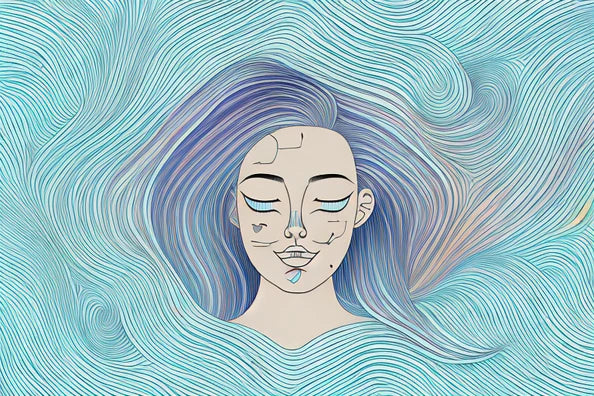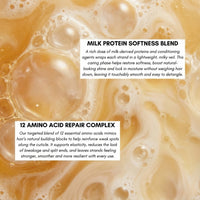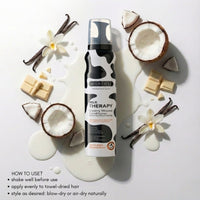Dealing with Flaky Scalp: A Natural Approach
Posted by MORFOSE COSMETICS

Have you ever looked in the mirror, only to find what appears to be snow on your shoulders? Alas, it's not snow, but flakes from your flaky scalp shedding dead skin cells! The good news is that organic hair care products offer an effective way to combat a flaky scalp. However, there are also other strategies you can employ to keep your scalp healthy and dandruff-free.
Why Do I Have a Flaky Scalp?
Flaky scalp can be caused by a variety of factors. Hair products laden with harmful chemical ingredients can lead to residue buildup on your scalp, resulting in inflammation, soreness, itching, and eventually, a flaky scalp. Other culprits include weather changes, stressful lifestyles, and underlying health issues.
While scientists are still working to pinpoint the exact causes of dandruff, several factors have been identified as potential contributors. Hormones, for instance, play a significant role, with dandruff often peaking during the teenage years. Additionally, a type of yeast that naturally resides on your scalp may also be a factor, though this isn't entirely certain.
Inherited conditions, including a dry or flaky scalp, can also be traced back to your genetic makeup, often inherited from your parents. Other factors that may lead to a flaky scalp include using chemically loaded hair products, improper shampooing routines, failure to rinse out all shampoo residue, underlying skin conditions, cold and dry weather, skin allergies, stress, and adverse reactions to hair products.
Here’s How You Can Fight a Flaky Scalp!
While scientists may not have identified a permanent solution for dandruff, there are steps you can take to keep dandruff and a flaky scalp at bay.
First and foremost, consider transitioning from chemical-laden hair products to natural or vegan alternatives. Many individuals unknowingly react to the chemicals found in hair care products. Simply switching to natural hair care products, like Replenhair's handmade products, which utilize natural ingredients, can make a significant difference.
To make the most of an anti-dandruff shampoo, apply it directly to your scalp for a few minutes before showering. Allowing the shampoo to remain in contact with your scalp for a while can maximize its effectiveness. You need not apply the shampoo to your entire hair; focusing on your scalp will suffice.
We also recommend incorporating organic hair care products such as Rice bran hair oil, Coconut rice hair oil, or Aloe rice hair oil to soothe your scalp. Massage the chosen organic hair care product onto your scalp at night, leaving it on until the morning. By sunrise, you can rinse off the natural hair product, as it will have had ample time to penetrate your scalp. Say goodbye to your flaky scalp!
Tips to Combat Dandruff
Regularly washing your hair helps eliminate flakes from your scalp. The frequency of washing may vary depending on your lifestyle and hair type, but typically once or twice a week should suffice. Using products like Replenhair Aloe Rice Shampoo can be a great place to start.
If dandruff persists, consider using an anti-dandruff shampoo or consult a professional. Once you notice a reduction in flakes and scales, you can alternate between regular and anti-dandruff shampoos to maintain a healthy balance.
Avoid scratching an itchy, flaky scalp, as it can exacerbate the issue. Scratching can lead to bleeding, soreness, and inflamed hair follicles, contributing to hair loss.
Can a Flaky Scalp Lead to Hair Loss?
In some cases, dandruff can cause hair loss due to scalp inflammation, infected hair follicles, and other factors. However, prompt and effective treatment can prevent further damage to your scalp and hair. For most individuals, managing dandruff is achievable with a straightforward hair care routine and the right natural hair care products. If dandruff persists, seeking medical advice is advisable.
Final Verdict
Don't disregard a flaky scalp, as dandruff can have adverse effects on your hair growth. Hair care products loaded with chemicals can be detrimental to scalp health. It is advisable to stick to natural hair products and organic hair care products. Your scalp deserves the care and attention that these natural alternatives can provide. Don't let a flaky scalp snow on your parade – embrace natural solutions for a healthier, flake-free head of hair!

Have you ever glanced in the mirror, only to find what appears to be snowflakes gently adorning your shoulders? Alas, it's not snow; it's the result of your flaky scalp shedding dead skin cells. But fear not, for there are natural remedies and solutions to combat a flaky scalp. In this comprehensive guide, we will delve into the world of flaky scalps, exploring why they occur, the various factors contributing to this condition, and most importantly, how to address and prevent it using organic hair care products and other practical strategies.
Why Do I Have a Flaky Scalp?
Flaky scalp can be attributed to an array of factors, with each one contributing to this bothersome issue. The primary culprits often include:
- Chemical-Laden Hair Products: Hair products containing harsh chemical ingredients can lead to residue buildup on the scalp. This buildup, in turn, can cause inflammation, soreness, itching, and eventually culminate in a flaky scalp. Transitioning to natural hair care products is a crucial step in mitigating this problem.
- Weather and Lifestyle Factors: External elements such as changes in weather, stress-inducing lifestyles, and health conditions can exacerbate flaky scalps. Maintaining a balanced and stress-free life can significantly benefit your scalp's health.
- Hormonal Changes: Hormones play a substantial role in the development of dandruff and a flaky scalp. This condition is particularly prevalent among teenagers when hormone levels are in flux. While hormones can be a suspected contributor, they aren't the sole cause of dandruff.
- Genetics: Sometimes, a dry or flaky scalp can be an inherited trait. If your parents dealt with dandruff, you might be more prone to it as well.
- Improper Hair Care Habits: Using chemically-loaded hair products, failing to shampoo your hair regularly or overdoing it, and not rinsing out all shampoo residue can all lead to a flaky scalp. Finding a balance in your hair care routine is essential.
- Underlying Skin Conditions: Scalp conditions like psoriasis and eczema can contribute to dandruff and flaky scalps. Addressing these conditions can significantly alleviate the issue.
- Environmental Factors: Chilly or dry weather can dry out the scalp and lead to flaking. Using protective measures during harsh weather can help maintain scalp health.
- Skin Allergies: Allergies, particularly those related to hair products, can cause scalp irritation and flaking. Opting for hypoallergenic and organic hair care products is a wise choice.
- Stress and Anxiety: High-stress levels can impact various aspects of health, including your scalp. Pursuing stress-relief techniques and maintaining emotional well-being can be beneficial.
- Adverse Reactions to Hair Products: Allergic reactions to certain hair products can manifest as a flaky scalp. Choosing natural hair products can help mitigate the risk of such reactions.
Natural Remedies for a Flaky Scalp
While researchers continue to explore the exact causes of dandruff and flaky scalps, there are proactive measures and natural remedies that can effectively address and prevent this issue. Here's how to combat a flaky scalp using a natural approach:
- Transition to Natural Hair Care Products: Switch from chemical-laden hair products to natural or vegan alternatives. Many individuals unknowingly react to the chemicals found in traditional hair care products, making this shift essential.
- Optimize Your Shampoo Routine: To maximize the effectiveness of an anti-dandruff shampoo, apply it directly to your scalp for a few minutes before showering. Focusing on your scalp during application allows the product to work its magic.
- Incorporate Organic Hair Care Products: Consider organic hair care products, such as Rice bran hair oil, Coconut rice hair oil, or Aloe rice hair oil, to soothe your scalp. Massage the chosen product onto your scalp at night and rinse it off in the morning, providing ample time for the natural ingredients to penetrate your scalp.
- Maintain a Balanced Hair Washing Routine: Regularly washing your hair helps remove flakes from your scalp. The frequency of washing may vary depending on your lifestyle and hair type, but typically once or twice a week should suffice. Opt for gentle, natural hair products like Replenhair Aloe Rice Shampoo.
- Consult a Professional: If dandruff persists, consider seeking advice from a professional. They can recommend an anti-dandruff shampoo or other treatments tailored to your specific condition.
- Avoid Scratching: While an itchy flaky scalp may tempt you to scratch, resist the urge. Scratching can exacerbate the issue, potentially leading to bleeding, soreness, inflamed hair follicles, and even hair loss.
Can a Flaky Scalp Lead to Hair Loss?
In certain cases, dandruff and a flaky scalp can contribute to hair loss. Factors such as scalp inflammation and infected hair follicles may result in hair loss. However, with prompt and effective treatment, you can prevent further damage to your scalp and hair. For most individuals, managing dandruff is achievable with a simple hair care routine and the use of natural hair care products. If dandruff persists, seeking medical advice is advisable to address any underlying issues.
Final Verdict
A flaky scalp should not be disregarded, as dandruff can have detrimental effects on hair growth. Hair care products loaded with chemicals can deteriorate scalp health. It's advisable to transition to natural hair products and organic hair care products to provide your scalp with the care and attention it deserves. Embrace natural solutions for a healthier, flake-free head of hair and say goodbye to the unwelcome snowfall on your shoulders. Your scalp and hair will thank you for making the switch to a natural approach to hair and scalp health.



